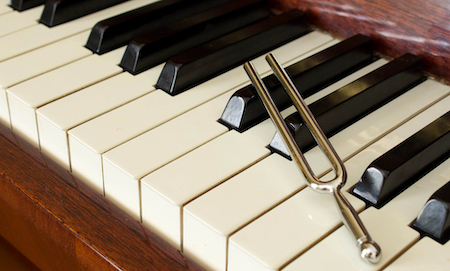Whether you’ve been playing your piano for years, or have recently purchased your first piano, determining if your piano is out of tune seems like a straightforward task. If you play a few notes, you should be able to hear if something is “off.”
But it’s not as simple as that.
It might be your first clue. If you play a song and it sounds tinny, sharp, or flat, it’s your first indication that it’s time for a tuning.
But a piano’s pitch may be off long before you notice it in the way you play a song.
Pianos can go out of tune for a number of reasons:
Humidity – humidity can impact your piano quickly, especially if it changes frequently inside your home. Music rooms should be kept at a minimum of 68 degrees, with humidity levels between 50 and 70 percent. Not only will a stable environment keep your piano in tune, but it will also prevent damage from the wood swelling.
It’s always a good idea to be conscious about where you place the piano in the room. Too much direct sunlight can further damage the wood. If you notice consistent fluctuations in the temperature or humidity levels inside your music room, it may be wise to invest in a dehumidifier to help keep the room’s conditions constant.
Lack of tuning – pianos need constant care. If it hasn’t been tuned in a while, it will take more maintenance to return it to playing conditions. When you work with a regular tuner, they can get a better understanding of what your piano needs to stay in tune. Once or twice per year is standard for a piano once it resides inside your home.
If you haven’t tuned your piano in years, it might not be able to hold a tune without extensive restoration. A full inspection can help you further understand the condition of your piano.
Poor tuning – while you can find videos online that will help you tune your piano, tuning isn’t something you can learn from watching a video. The best tuners have thousands of hours of experience. If you have your piano tuned, and realize it’s out of tune just a few short weeks later, there’s a chance it’s been poorly tuned.
Tuning an acoustic piano today means using electronic instruments as well as a well-trained ear to determine the proper tone. Don’t look at price alone when selecting a tuner – some may cut corners simply to bring in a customer base. Once you’ve found a piano tuner that you trust, try to maintain the relationship to ensure your piano stays properly tuned.
Age – age impacts playability. The older an instrument is, the more maintenance it will take to continue sounding its best.
That’s not saying a used instrument is bad. If you know its history and maintenance schedule, it can be a great investment. Still, realize that everything has a useful life, and the older it gets, the greater chance it will need maintenance work to keep it in good working condition.
When was the last time your piano was properly tuned? If a piano is out of tune, it won’t sound its best, and will be more difficult to play. To create the best sound possible from your piano, get it tuned today.


